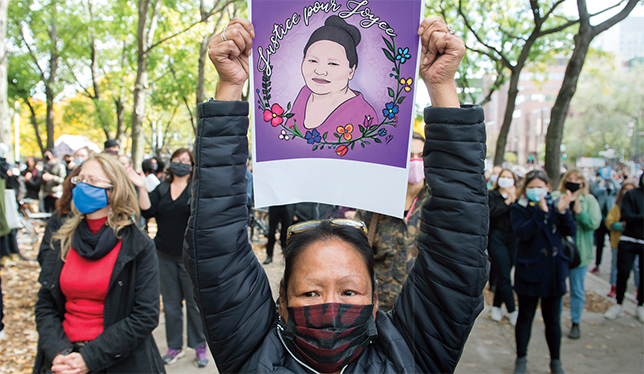On September 28, 2020, Quebec residents were shaken to learn of the death of Joyce Echaquan, an Atikamekw woman whose social media posts denounced the mistreatment she suffered at a hospital in Joliette, Que. Her tragic death led to the development of Joyce’s Principle by the Atikamekw Nation and, in turn, to the creation of the Joyce Echaquan Scholarship by two professors.
Developed in 2020, Joyce’s Principle calls for, among other things, the right for Indigenous people to have access to all health and social services without discrimination. “I asked myself what I could do, with the resources I have, to further Joyce’s Principle,” said Suzy Basile, a professor at Université du Québec en Abitibi-Témiscamingue (UQAT) and research chair on Indigenous women’s issues.
“I thought we could earmark some money for a student to do a master’s degree on an aspect of Joyce’s Principle. It could be through the lens of social sciences, law, political science, anthropology, health or one of many other fields,” added Dr. Basile, an Atikamekw researcher.

Generous partners
After obtaining permission from Ms. Echaquan’s family to name the scholarship after her, Dr. Basile approached her employer and other partners. She and her colleague Carole Lévesque, a professor at the Institut national de la recherche scientifique (INRS — National Institute for Scientific Research, in Quebec City) and director of the Réseau de recherche et de connaissances relatives aux peuples autochtones (Indigenous Peoples’ Research and Knowledge Network), each secured $18,000 from their respective universities to fund the initiative, providing total funding of $36,000 over two years to the recipient. “That’s a little more than what the usual granting agencies offer. We wanted to be more attractive and show we were serious,” said Dr. Basile.
The two researchers decided the scholarship recipient would be an Indigenous woman who, through a master’s degree at UQAT or INRS, would help advance Joyce’s Principle. The initiative then attracted the attention of Quebec’s chief scientist and the Fonds de recherche du Québec (FRQ —Quebec Research Fund), who added another $36,000 to the total amount, allowing the scholarship to be awarded two years in a row.
The first recipient, in 2021, was Lucie Dubé, from the Atikamekw community of Opitciwan, in Quebec’s Mauricie region. Cree researcher Linda L. Shecapio has been awarded the scholarship in 2022.
A proven scholarship
Ms. Shecapio’s master’s thesis focuses on reclaiming the role of iiyiyiuu/iinuu iskweuch (Cree women) in family healing and well-being in the territory of Eeyou Istchee. It will develop a model of care that takes into account the traditional roles and responsibilities of women in the healing and well-being of the Cree people.
Though already working as an independent consultant and elected official for the Cree community of Mistissini, in northern Quebec, Ms. Shecapio has been greatly motivated by the scholarship to move forward with her research. “I always knew I was going back to university,” she said. “I’ve gained a lot of experience and knowledge about my area and the needs of the people. I also became a grandmother. I think that’s what motivated me when I saw the scholarship. I thought about their future.”
Dr. Basile and her partners hope to continue awarding the Joyce Echaquan Scholarship beyond the first two recipients. Louise Poissant, scientific director of the FRQ – Société et culture, points out that there are also other efforts underway to increase the number of Indigenous people pursuing graduate studies. A working group was established by the FRQ in the past year and has come up with new ideas to attract Indigenous youth to research.
“You have to develop their curiosity as early as possible,” said Dr. Poissant. A $1-million dollar investment will soon be distributed by the FRQ to partners across Quebec to generate interest and hopefully allow the Joyce Echaquan Scholarship to continue being awarded.